Related Research Articles
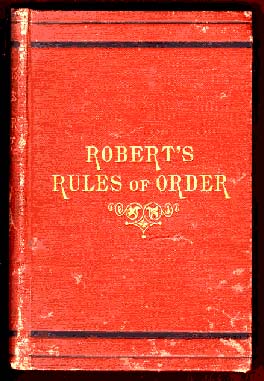
Robert's Rules of Order, often simply referred to as Robert's Rules, is a manual of parliamentary procedure by U.S. Army officer Henry Martyn Robert. "The object of Rules of Order is to assist an assembly to accomplish the work for which it was designed [...] Where there is no law [...] there is the least of real liberty." The term Robert's Rules of Order is also used more generically to refer to any of the more recent editions, by various editors and authors, based on any of Robert's original editions, and the term is used more generically in the United States to refer to parliamentary procedure. It was written primarily to help guide voluntary associations in their operations of governance.
In politics, lobbying, or advocacy, is the act of lawfully attempting to influence the actions, policies, or decisions of government officials, most often legislators or members of regulatory agencies, but also judges of the judiciary. Lobbying, which usually involves direct, face-to-face contact in cooperation with support staff that may not meet directly face-to-face, is done by many types of people, associations and organized groups, including individuals on a personal level in their capacity as voters, constituents, or private citizens; it is also practiced by corporations in the private sector serving their own business interests; by non-profits and non-governmental organizations in the voluntary sector through advocacy groups to fulfil their mission such as requesting humanitarian aid or grantmaking; and by fellow legislators or government officials influencing each other through legislative affairs in the public sector.

Parliamentary procedures are the accepted rules, ethics, and customs governing meetings of an assembly or organization. Their object is to allow orderly deliberation upon questions of interest to the organization and thus to arrive at the sense or the will of the majority of the assembly upon these questions. Self-governing organizations follow parliamentary procedure to debate and reach group decisions, usually by vote, with the least possible friction.

A Juris Doctor, Doctor of Jurisprudence, or Doctor of Law (JD) is a graduate-entry professional degree that primarily prepares individuals to practice law. In the United States, it is the only qualifying law degree, while other jurisdictions, such as Australia, Canada, and Hong Kong, offer both the postgraduate JD degree as well as the undergraduate LL.B., BCL, or other qualifying law degree depending on the requirements of the jurisdiction where the person will practice law.
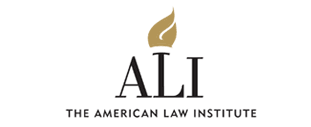
The American Law Institute (ALI) is a research and advocacy group of judges, lawyers, and legal scholars established in 1923 to promote the clarification and simplification of United States common law and its adaptation to changing social needs. Members of ALI include law professors, practicing attorneys, judges and other professionals in the legal industry. ALI writes documents known as "treatises", which are summaries of state common law. Many courts and legislatures look to ALI's treatises as authoritative reference material concerning many legal issues. However, some legal experts and the late Supreme Court Justice Antonin Scalia, along with some conservative commentators, have voiced concern about ALI rewriting the law.

A paralegal, also known as a legal assistant, or paralegal specialist is a legal professional who performs tasks that require knowledge of legal concepts but not the full expertise of a lawyer with an admission to practice law. The market for paralegals is broad, including consultancies, companies that have legal departments or that perform legislative and regulatory compliance activities in areas such as environment, labor, intellectual property, zoning, and tax. Legal offices and public bodies also have many paralegals in support activities using other titles outside of the standard titles used in the profession. There is a diverse array of work experiences attainable within the paralegal field, ranging between internship, entry-level, associate, junior, mid-senior, and senior level positions.
Legal ethics are principles of conduct that members of the legal profession are expected to observe in their practice. They are an outgrowth of the development of the legal profession itself.

The American Bar Association (ABA) is a voluntary bar association of lawyers and law students; it is not specific to any jurisdiction in the United States. Founded in 1878, the ABA's stated activities are the setting of academic standards for law schools, and the formulation of model ethical codes related to the legal profession. As of fiscal year 2017, the ABA had 194,000 dues-paying members, constituting approximately 14.4% of American attorneys. In 1979, half of all lawyers in the U.S. were members of the ABA. The organization's national headquarters are in Chicago, Illinois, and it also maintains a significant branch office in Washington, D.C.
A bar examination is an examination administered by the bar association of a jurisdiction that a lawyer must pass in order to be admitted to the bar of that jurisdiction.

Minutes, also known as minutes of meeting, protocols or, informally, notes, are the instant written record of a meeting or hearing. They typically describe the events of the meeting and may include a list of attendees, a statement of the activities considered by the participants, and related responses or decisions for the activities.
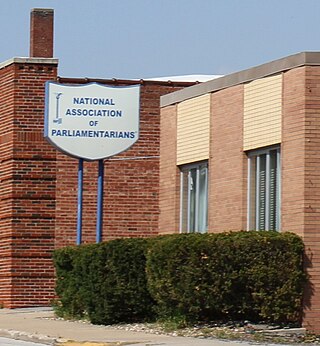
The National Association of Parliamentarians (NAP) is an organization with membership predominantly in the United States that says that it provides services and products to help its members and others to learn how to proceed with and manage meetings of assemblies such as school boards, homeowners associations, church boards, and volunteer organizations. It also provides education and accreditation for parliamentarians who provide services to these types of organizations.
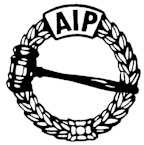
The American Institute of Parliamentarians (AIP) is a not-for-profit educational organization founded in 1958. The objectives of AIP are to promote the use and teaching of parliamentary procedure, as well as the training and certification of parliamentarians.
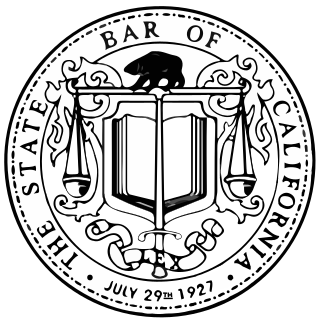
The State Bar of California is an administrative division of the Supreme Court of California which licenses attorneys and regulates the practice of law in California. It is responsible for managing the admission of lawyers to the practice of law, investigating complaints of professional misconduct, prescribing appropriate discipline, accepting attorney-member fees, and financially distributing sums paid through attorney trust accounts to fund nonprofit legal entities. It is directly responsible to the Supreme Court of California; however, its trustees are now appointed by the Supreme Court, the California Legislature, and Governor of California. All attorney admissions are issued as recommendations of the State Bar, which are then routinely ratified by the Supreme Court. Attorney discipline is handled by the State Bar Office of Chief Trial Counsel, which acts as prosecutor before the State Bar Court of California. The State Bar has been cited for its corrupt practices during the 21st century, and is subject to reforms issued by its governing body, the California Supreme Court.
A parliamentary authority is a book of rules for conducting business in deliberative assemblies. Several different books have been used by legislative assemblies and by organizations' deliberative bodies.
In the United States, a parliamentarian is an expert on parliamentary procedure who advises organizations and deliberative assemblies. This sense of the term "parliamentarian" is distinct from the usage in parliamentary republics and monarchies as a synonym for member of parliament.

Demeter's Manual of Parliamentary Law and Procedure is a parliamentary authority manual by George Demeter. It is included in the bank of study materials used in preparing for the Certified Parliamentarian (CP) designation offered by the American Institute of Parliamentarians. Similar to Robert's Rules of Order, Demeter's Manual notes, "Without rules, there would be injustice and confusion. Hence, it is as necessary to follow the rules of parliamentary law as it is to follow the rules of a ball game or a card game." The book attempts to include everything a presiding officer might need to know, including public courtesies and ceremonies; sample prayers for opening a meeting; organizing a new lodge, chapter or post; times of fraction and discord; acquisition of new members; installation of officers; and adjournment. Chapter 16 contains an "entire meeting in drill form," designed to illustrate a range of parliamentary motions and situations and how a chairman would handle them. Demeter also devotes space to discussing strategic use of parliamentary procedure. The book concludes with "The Greatest Convention Ever Held", an account of the Creation in parliamentary terms.
Construction law is a branch of law that deals with matters relating to building construction, engineering, and related fields. It is in essence an amalgam of contract law, commercial law, planning law, employment law and tort. Construction law covers a wide range of legal issues including contract, negligence, bonds and bonding, guarantees and sureties, liens and other security interests, tendering, construction claims, and related consultancy contracts. Construction law affects many participants in the construction industry, including financial institutions, surveyors, quantity surveyors, architects, carpenters, engineers, construction workers, and planners.

Ajith Perera is a Sri Lankan politician and member of Parliament, who commenced his political career as a member of the Provincial Council of the Western Provincial Council in 2009. A lawyer by profession, he was first elected to the Parliament of Sri Lanka in 2010 as a member of the United National Party from the Kalutara District. He was re-elected to the Parliament in 2015.
A president is a leader of an organization, company, community, club, trade union, university or other group. The relationship between a president and a chief executive officer varies, depending on the structure of the specific organization. In a similar vein to a chief operating officer, the title of corporate president as a separate position is also loosely defined; the president is usually the legally recognized highest rank of corporate officer, ranking above the various vice presidents, but on its own generally considered subordinate, in practice, to the CEO. The powers of a president vary widely across organizations and such powers come from specific authorization in the bylaws like Robert's Rules of Order.

In the United States, those seeking to become lawyers must normally pass a bar examination before they can be admitted to the bar and become licensed to practice law. Bar exams are administered by states or territories, usually by agencies under the authority of state supreme courts. Almost all states use some examination components created by the National Conference of Bar Examiners (NCBE). Forty-one jurisdictions have adopted the Uniform Bar Examination (UBE), which is composed entirely of NCBE-created components.
References
- ↑ Slaughter, Jim (2012). The Complete Idiot's Guide to Parliamentary Procedure Fast-Track. New York, IN: Alpha. pp. 140–41. ISBN 978-1615642205.
- ↑ "Purpose of the American College of Parliamentary Lawyers". parliamentarylawyers.org. Archived from the original on 2015-09-13. Retrieved 2016-02-18.
- ↑ "Chill with the Parliamentary Law All-Stars". ABA Journal. 94 (3): 12. March 2008.
- ↑ Stewart, Christine (2016-01-25). "What Compensation Can I Get For My Car Accident?" . Retrieved 2024-07-04.
- ↑ "Membership Qualifications". parliamentarylawyers.org. Archived from the original on 2015-09-13. Retrieved 2016-02-18.
- ↑ "Bylaws of the American College of Parliamentary Lawyers, INC". parliamentarylawyers.org. Archived from the original on 2015-09-13. Retrieved 2016-02-18.